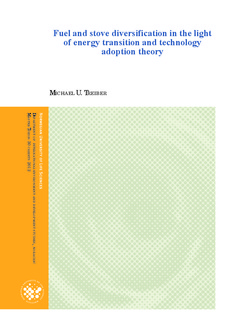Fuel and stove diversification in the light of energy transition and technology adoption theory
Master thesis
Permanent lenke
http://hdl.handle.net/11250/187873Utgivelsesdato
2012-10-03Metadata
Vis full innførselSamlinger
Sammendrag
In energy transition theory the dominant approach is the energy ladder model which
emphasizes household’s income as major driver and implies a complete transition from one
fuel to another. In reality, however, households diversify their energy consumption and
utilize a variety of fuels simultaneously. Social, cultural and individual characteristics have
been identified to play a crucial role in household’s fuel choice. Despite these notions, no
alternative model has been developed for interpreting and understanding energy transition
and associated technology adoption that incorporates these forces.
This thesis proposes a framework illustrating the dependencies driving fuel and stove
adoption and explaining the multiple fuel and stove approach whereas a second model
pictures the process of adoption by households. The underlying assumption of these
frameworks - the intended task’s nature and context determine stove and fuel choice and that
hence the multifaceted demands of the households are the major driver fuel diversification -
has proven to be the case for the particular study area in three regions in Kenya. Most
households own and use a variety of different fuels for a particular task but have in every
case a preference for a particular one. Energy security was often stated to be an important
reason for such fuel diversification. However, context and situation of the fuel and stove use
was much emphasized to shape the stratum of potential fuels and stoves and proves the
assumption of task dependency. Households strive to be prepared for every situation and
context where different fuels have to be applied. The effect of income was found to be rather
about the quantity of energy consumed and not about its quality. Availability and access to a
particular stove and fuel have been identified to play a much greater role. Cultural and
traditional issues such as local cuisine are demonstrated to highly influence the stove and fuel
choice while personality traits such as age or education were not found to be statistically
relevant but are assumed to have a certain weight on household’s selection.
Beskrivelse
German Agency for International Cooperation
